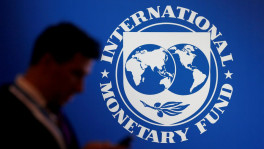Division or dialogue with China?
Joe Biden’s presidency amounts to a golden opportunity to initiate a direct and honest dialogue with China on issues that require constructive engagement. But time is of the essence. If Biden begins his term by choosing division over dialogue, changing course will soon become difficult, if not impossible.

Americans don't agree on much of anything nowadays. Yet they are largely united in their belief that China represents an existential challenge to their country and the international order it has long led. This combination of internal division and external demonization has made the Sino-American rivalry increasingly inescapable – and potentially catastrophic.
America's internal divisions have been fueled in recent years by social media, which, by populating users' feeds with tailored content, creates "echo chambers" that reinforce, rather than challenge, their beliefs and values. When alternative ideas do make it into the echo chamber, they are often distorted or smeared. And when someone within the chamber calls into question shared beliefs, they risk being instantly ostracized or, in contemporary parlance, "canceled."
This ultra-reactive demonization of diverging views not only flattens discourse; it also narrows the space between disagreement and conflict – even violent conflict. Widespread frustration with leaders' failure to deliver justice, security, and opportunity heightens the risks further.
The same tendencies can be seen in America's approach to China. For example, the US State Department's just-released report, "The Elements of the China Challenge," villainizes the Communist Party of China, describing it as "unconstrained by respect for individual liberty and human rights."
The report also stokes fear of China's supposed "authoritarian goals" and "hegemonic ambitions," which imply a desire to infuse the US-led global order with its own social and political model. And it recommends that the United States build a united front against China, in order to secure – by military force, if necessary – "freedom" for the world.
None of this has gone unnoticed in China, which has been conducting its own, increasingly unfavorable assessment of the US. It now seems clear to China's leaders, citizens, and businesses that, far from a land of freedom and opportunity, the US is a deeply fragmented society, blighted by systemic racism, rising inequality, and a lack of common purpose – ills that have long been obscured by fantasies about the "American Dream."
Moreover, far from being the exemplar of democracy, the US has a highly distorted political system. Its institutions, including the Electoral College, the Senate, and the Supreme Court, and practices such as gerrymandering, strategic reduction of polling places, and onerous voter verification rules, mean that the majority does not always rule. Wealthy donors purchase influence, whether by financing campaigns or buying up the media.
As China has shed long-held illusions about the US, its hopes for a constructive bilateral relationship have diminished. To be sure, President-elect Joe Biden is unlikely to sustain the roller-coaster ride of surprise attacks, reversals, disruptions, and near-misses President Donald Trump engineered. But less chaotic does not necessarily mean less confrontational: Biden has called Chinese President Xi Jinping a "thug" and pledged to lead a coordinated campaign to "pressure, isolate, and punish China."
So, China is preparing for the worst. This may mean a continuation of Trump's trade war or more senseless finger-pointing over the spread of COVID-19. It may even mean military tensions involving Taiwan, the South China Sea, and China's western borders.
But this does not mean China is stooping to American-style isolationism and demonization. On the contrary, despite the ham-fisted "wolf warrior" tactics of some diplomats, China has taken important steps to advance international cooperation in key areas of shared concern. For example, on climate change, Xi committed at the United Nations to achieve peak carbon-dioxide emissions before 2030 and to aim for carbon neutrality before 2060.
On trade, China has signed the Regional Comprehensive Economic Partnership, whose 15 member countries account for 30% of humanity. Much to the world's surprise, it has also indicated that it might join the Comprehensive and Progressive Agreement for Trans-Pacific Partnership, which emerged after Trump withdrew the US from the original Trans-Pacific Partnership.
The US – which is struggling to get the pandemic under control, and seems to be headed toward a double-dip recession – would do well to take a similar approach. Trade is the only way it can escape its current economic predicament. That includes trade with China – the first major economy to recover from the pandemic shock, and the only one to record positive GDP growth in 2020.
But this will be impossible, as long as misapprehensions, antagonism, and mutual suspicion dominate the bilateral relationship. As former Secretary of Defense Jim Mattis said, the US has two key powers: the power of inspiration and the power of intimidation. In dealing with China – an economic powerhouse with a population of 1.4 billion – intimidation will not work. China will not be cowed into submission on its domestic affairs, such as Hong Kong, Xinjiang, and Taiwan.
There is still time, however, for the US to use the power of inspiration to show that it and China can be equal partners in peace, working together to confront shared challenges. There is a moral dimension to this imperative. Many outsiders, including Chinese, cannot comprehend how the world's most technologically advanced country could have allowed over 260,000 people to die from a virus that much poorer countries have combated far more successfully with simple measures. For cooperation to work, the US needs to demonstrate its ability to think in terms of "we," rather than "I."
As Rabbi Jonathan Sacks explains, "The world is divided into the people like us and the people not like us, and what is lost is the notion of the common good." China's enduring commitment to multilateralism indicates that it recognizes this. It is time for the US to do the same, and to embrace a direct and honest dialogue on issues that require constructive engagement.
Biden's presidency amounts to a golden opportunity to initiate this crucial conversation. But time is of the essence. If Biden begins his term by choosing division over dialogue, changing course will soon become difficult, if not impossible.
Andrew Sheng, Distinguished Fellow of the Asia Global Institute at the University of Hong Kong and a member of the UNEP Advisory Council on Sustainable Finance, is a former chairman of the Hong Kong Securities and Futures Commission. His latest book is From Asian to Global Financial Crisis.
Xiao Geng, Chairman of the Hong Kong Institution for International Finance, is a professor and Director of the Research Institute of Maritime Silk-Road at Peking University HSBC Business School.
Disclaimer: This opinion first appeared on project-syndicate.org, and is published by special syndication arrangement.


 Keep updated, follow The Business Standard's Google news channel
Keep updated, follow The Business Standard's Google news channel
















